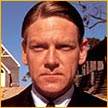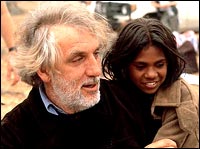
|
Heart-breaking drama
Philip Noyce has an Oscar contender in Rabbit-Proof Fence
|
Arthur J Pais
It is not easy to make a taut, pulsating and memorable small film after directing such Hollywood spy thrillers as Clear And Present Danger.
Yet, Australian director Phillip Noyce has done the unthinkable by making two wonderful movies the same year. His Rabbit-Proof Fence arrived in America after winning critical acclaim and enjoying a solid run at the box-office in Australia and England.
The film follows his last week's triumph, The Quiet American, a political murder mystery-cum-love story based on a Graham Greene novel.
Both films released by Miramax are worthy Oscar contenders in major departments.
The heart-breaking movie Rabbit-Proof Fence, however, does not owe its drama to a world-renowned novelist. It is also based on a book that tells the true story of three Aboriginal girls of mixed parentage who defied Australia's policy of abducting such children from their parents and relocating them far away.
The 14, ten and eight-year-old girls created history by walking along a 1,500-mile long rabbit-proof fence (built to keep off rabbits), that cuts across the nation and getting back home.
The practice of displacement that lasted from 1905 to 1971 was inspired by the belief the government was 'rescuing' the children from what it felt was a life of illiteracy and poverty. The children were placed in state homes and were trained to be maids or farm workers. The government hoped that eventually the children would be integrated into the white society.
Australian conservatives slammed the movie and defended the defunct policy as a tool meant to benefit the aboriginal children. Others called the story of 'stolen generations' one of the most shameful acts in the country's history.
Noyce extracts astonishing performances from the children. He also gets wonderful support from Kenneth Branagh who plays A O Neville, chief protector of aborigines for Western Australia.
 Noyce said the movie derived its power from the heroic, life-affirming story written by Doris Pilkington Gaimara, daughter of Molly Craig, who was 14 when she and two other girls marched across the country in 1931. Their story was so powerful and riveting, he asserted, that it did not need great expertise to be made into a film.
Noyce said the movie derived its power from the heroic, life-affirming story written by Doris Pilkington Gaimara, daughter of Molly Craig, who was 14 when she and two other girls marched across the country in 1931. Their story was so powerful and riveting, he asserted, that it did not need great expertise to be made into a film.
We, of course, know that in the hands of a lesser and uncommitted director, the movie could have become an over-wrought melodrama.
Though the film deals with Australia's heinous past, it can resonate with people across the globe partly because its politics is secondary to the story of triumph over inhumanity and adversity.
In crafting a touching and gripping film questioning the arrogance of colonialism, Noyce, 53, who made interesting low-budget movies in Australia before moving to Hollywood, has earned a sort of redemption.
He has also joined major filmmakers like John Huston (The Dead) who have had the courage to return to their original muse despite their Hollywood connection.
Tell us what you think of this review